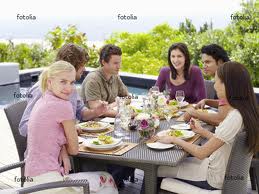Tennis culture - its own little world!
The dominant culture in the world is American. In my generation we haven't all developed Chinese habits, or Indian or African ones. It's been American all the way.
Every country you go to resembles small town or big city USA. Attempts to incorporate local architecture into skyscrapers, or local traditions into national education programmes are largely token gestures. The USA led the way in so many fields by the end of the nineteenth century, and they haven't looked back.
The USA has been very fortunate. They picked up on the industrial revolution a little late, avoided the teething problems that some of the European economies had, and found that their richer local resources could create an even more complex and profitable industrial revolution than the Europeans had done. They suffered hardly any damage through the World Wars, in fact their industrial production was encouraged because of the shortfall in Europe. Since the American Civil War it has been only win, win, win for the USA.
This superior industrial capacity created capital, which created even more industrial capacity and invention. It created opportuiites for wealth. Through wealth a society can partake increasingly in leisure. Leisure activities that are expensive can be undertaken by the rich.

Tennis for the rich
For tennis in the early days this was the case. Facilities and equipment were for the rich. A sport like soccer was for the working classes - cheap to play. Next door to me in my childhood in UK was a Vicarage. The "vicar" , or the house owner, had a grass tennis court in his garden! He had mowers, marking machines, nets and tennis furniture, just right for a tennis afternoon followed by a pot of tea and scones. I played on it a few times. What a pleasure!
When I played in my first UK tennis club, the club had lawyers and doctors and airline pilots and business people as their members. There was no coaching done on the courts at all. Only doubles were played. People standing around in long trousers getting a bit of fresh air, scoring a bit, saying well played, and then letting the next group on. Then retire to the clubhouse for a cup of tea. It was just a type of golf club.
Tennis does create a social environment when played like this. To be able to afford the membership fees you have to have money, and then you need time to go down to the courts several times every week. The working classes are excluded. When you are on the court, playing, you have close contact with the participants. The real key is the doubles. You develop real friendships, and a real idea what people can do and can't. Playing doubles makes you select friends and non-friends very effectively. Singles doesn't do this. As soon as you get into individual combat situations, you may think you can decide on the psychology of an opponent, but in fact he is hiding a lot of his skills from you deliberately. In doubles he is giving it to you for free. Just a quick note about team sports like soccer. In team sports you do develop friendships, but it is on a much more superficial level than tennis doubles. A sort of togetherness euphoria does develop, but tennis doubles gets quite like a marriage. I've had some amazing doubles partners in my time. You experience all the highs and lows of a tennis match together. You've got to get out of difficult situations together, you've got to win together. It's great. Tennis doubles culture is very very special.

In the early development of the game doubles was the main activity. There were singles championships, and it was understood that this was for the sportier, "loner", ambitious types. These sorts of people exclude themselves naturally from the mainstream. A "winner" type doesn't always make himself popular with colleagues. It's disagreeable to have someone in your midst who wants to win, who wants to beat everyone.
Professional culture
Only in the advent of the professional era (since 1968), which coincided with a great expansion in the mediatisation of the game, via TV, has singles become the Number One format. For those countries which run programmes to create champions, ONLY singles players are developed. In the great French tennis academies there is none for doubles specialists, who incidentally can also have very lucrative careers from the game. In Britain, doubles is still the norm. The social game has become less important, no question about that , but doubles is, socially, the preferred format. When you lose a singles you tend not to want to play against that person again. When you play doubles, a defeat is easily wiped from the slate.
In the USA, the country club, rich with leisure time, type tennis environment is still dominant. There are tennis centres specifically for the development of potential professionals, some expensive, some of reasonable cost. Some are even designed for attracting those from the working classes, or ethnically excluded groups. The Americans do this better than anyone. They talk, and put in place, challenging, professional, inclusive structures. Any type of tennis player can find their niche.
Enviable French
In a country like France, facilities are supplied in one way, like all sports, from the state. That means that every citizen expects a "minimum price" delivery of a certain sport in every town. He expects all the ancillary services around tennis to be supplied too, because it is the state who does it. They should know. This over-reliance on the state means that the French system has almost no professionalism, no discipline, no "business ethic" behind any facility. Facilites are in poor condition, toilets and showers aren't cleaned, cleaners don't come round. Doors are opened late and shut early. There are no staff about. There is no buzz of activity around a club. Even a club professional creates a low profile, because it is ill-seen for anyone to be making money, "getting rich" from a state facility.
People aren't there to mix with each other either. A tennis club is for sport delivery, by the state. It is not a place where people enjoy themselves, develop social groups, involve themselves in any sort of networking. This affects outdoor and indoor facilities identically.
In Germany, the seasons are very split. That means in the hall season you will be playing, paying an hourly fee, in a private tennis hall. Unless it is a mass booking from the club, for say, match training, you will be booking as a private individual. The hall owner must make money from his facility. Some people stop playing in winter, but most don't. The reason is that halls are very well equipped, have excellent bars and showers, all beautifully clean, designed to make money from the clientele.
In summer, the club, often on a different site to the hall, moves onto sand courts that are open from May to September, a very short season, especially bearing in mind that there are schoool holidays for seven weeks in July and September where no-one plays anyway! The people all come onto the summer courts and greet each other for the first time since the previous June. It's quite weird.
These are proper clubs. That means they are not there to make money, but the professional German ethic is still there. Frequently, even in the smallest clubs, coaches , full time ones, are to be seen on the courts. Everyone understands that that coach makes his living from the game, so they pay correct prices. They know that when the "tennis season" only lasts ten weeks, any coaching fees have a limited duration. It won't break the bank. For this reason, coaches in Germany often have much less work in winter (or enormous workloads in May/June), or, a very different clientele in winter, based around maybe hobby players wanting a winter activity, or serving children whose parents want them out of the house in the long dark winter months.
Which type of tennis culture do I prefer?
It certainly isn't the British one, that is why I had to emigrate, much as I appreciate, respect, and enjoy the heightened, year round, social aspect of British tennis.
In Germany the tennis year is too irregular. The summer season is too short and intensive; the winter season is too long, expensive, with very little competition available.
France is close to tennis paradise. That is why I am here. Facilities aren't great, the people are desperately unprofessional, there is no social tennis envioronement to speak of. Nobody plays doubles. That's not a good start. But the facilites are plentiful, and available, and cheap. Competitions are going on all year round, and the playing level is very high, technically. For my needs, this is wonderful tennis culture. But it isn't what a lot of other cultures would have in mind.
Have A Great Story About This Topic?
Do you have a great story about this? Share it!
